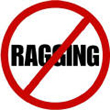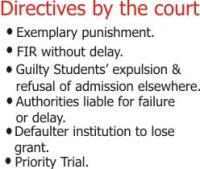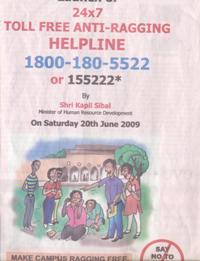


Supreme Court approves stringent anti-ragging measures
Getting tough with those indulging in ragging on campuses, the Supreme Court on Wednesday ordered compulsory registration of FIR by educational institutions and exemplary and deterrent punishment to perpetrators to check the menace that has led to suicides by freshers in various parts of the country.
“Every single incident of ragging, where the victim or his parent/guardian or the Head of Institution was not satisfied with the institutional arrangement for action a First Information Report must be filed compulsorily by the institutional authority with the local police authorities,” the court said. Accepting the R K Raghvan Committee’s report on ragging, the apex court also directed the courts below to ensure that cases of ragging were taken up on a priority basis and in a speedy manner to avoid inconvenience to the victims and send a stern message.
“Any failure or negligence on the institutional authority to file an FIR with the local police, on dissatisfaction of the victim with the institutional redress mechanism…shall be construed as an act of culpable negligence on the part of institutional authorities,” it said. The court, however, clarified that filing of FIR by the victim or his parents directly with the police would not absolve the institutional authorities of their responsibilities in this regard.
A Bench of Justice Arijit Pasayat and Justice S H Kapadia, which had earlier passed directions to purge the students’ union elections from the influence of money and muscle power, passed a slew of directions to rid Indian campuses of the abhorrent practice. It ordered all educational institutions to ensure that special anti-ragging committees/squads were constituted forthwith and it shall be the duty of their duty to see that the court’s directives were implemented in letter and spirit.
It also asked the Raghvan Committee to monitor the functioning of the anti-ragging committees/squads and submit further report to it. The apex court asked the educational institutions to include in their prospectus a specification seeking an undertaking from the candidate that he/she was not be involved in ragging. In case the undertaking is found to be false the student shall be expelled from the institution, the order said. Observing that it would be the collective responsibility of the institutions to check ragging, the court in case of any lapses in this regard, their aid/assistance from the Government.
The court also directed the NCERT and SCERTs to explore the possibility of introducing separate chapters on evils of ragging under ‘Human Rights’ topic in curricula for various classes.
It asked the Centre and the state governments to launch programmes to give wider publicity to menace of ragging and its consequences among the students to dissuade them from indulging in such activities.
In its voluminous Report, Raghavan Committee has recommended amendment in the Indian Penal Code to create a separate offence of ‘ragging’ and changes in the Criminal Procedure Code and the Indian Evidence Act to ensure that ragging cases are tried expeditiously.
The Committee also recommended ban corporal punishment in primary and secondary educational institutions as it felt that it was a contributory factor for students to develop bullying tendencies and indulge in ragging.
Important Instructions & Information for students and parents